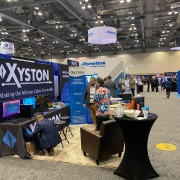Tearful Rep. Strong is “100 percent sure” Space Command is Coming to HSV
On July 30, 2025, at the Von Braun Center, Rep. Dale Strong tearfully declared he is “100 percent sure” that U.S. Space Command will relocate to Redstone Arsenal. He also hailed the recently passed “One Big Beautiful Bill” (BBB) as a safeguard for 90,000 Alabama jobs, particularly in defense and aerospace sectors critical to Huntsville. But while his statements sparked enthusiasm, the reality behind these claims is more complex — and holds significant implications for Huntsville’s business community.
Space Command: Strong’s Confidence vs. Hard Facts
At the VBC event, Strong cited private discussions with former President Trump and a Department of Defense Inspector General (IG) report estimating Huntsville would save approximately $426 million over 15 years if Space Command relocates here. He portrayed the move as inevitable, backed by solid economic logic and growing political momentum.
The cost-saving figure is indeed supported by both the DoD IG and the Government Accountability Office (GAO) (1). However, these same reports raise serious operational concerns. Up to 88% of the current civilian workforce might decline to relocate, and new infrastructure at Redstone Arsenal would take 3–4 years to be fully operational (2). This kind of workforce instability could delay mission readiness and strain operations.
Strong also alleged that General James Dickinson, who reversed his initial support for Colorado Springs, purchased a $1.5 to $1.6 million ranch in Colorado shortly after changing his recommendation. Alabama officials, including the state attorney general, have taken interest in this claim (3). Yet, there’s no formal investigation confirming wrongdoing, and neither the IG nor GAO reports mention any ethical concerns related to this purchase (1, 2).
Without an official federal decision, Strong’s narrative leans heavily on political momentum and unverified allegations. For Huntsville, the future of Space Command remains uncertain — and the potential impact on local jobs and infrastructure could be profound.
The Big Beautiful Bill: Big Gains, Big Trade-Offs
Passed by razor-thin margins on July 4, 2025, 215–214 in the House and 51–50 in the Senate, the BBB allocates $157 billion in military and security spending. It earmarks $100 million specifically for upgrades at the Marshall Space Flight Center, a critical investment for Huntsville’s aerospace sector (5).
Strong actively lobbied for the bill, portraying it as vital to protecting Alabama’s defense infrastructure and jobs. Local defense contractors such as Leidos and Torch Technologies stand to benefit significantly.
But the bill’s benefits come at a cost. Independent analyses predict more than 220,000 Alabamians could lose healthcare coverage, with rural hospitals facing closure. Tax cuts disproportionately favor high-income earners: middle-income households average $1,750 in tax relief, top earners nearly $11,000, and low-income families just $150 (5). These disparities raise concerns about the bill’s long-term impact on economic equity and public health, especially for vulnerable rural communities.
The Brain Trust: Huntsville’s Most Vital Asset
Huntsville’s strength lies not just in buildings or budgets but in its people, its brain trust. The city boasts approximately 61 engineers per 1,000 workers, nearly five times the national average. STEM roles make up 23% of the local workforce, the highest share among U.S. metropolitan areas. Its engineering jobs have a location quotient of 2.44, meaning the city employs more than double the national average per capita (6).
Cummings Research Park, the second-largest research park in the nation, houses 300 companies and 26,000 employees. Redstone Arsenal supports up to 40,000 personnel daily, anchoring this defense cluster (6).
At the VBC, when asked if uncertainty around Space Command or shrinking funding threatens this brain trust, Strong said, “You’re always gonna be concerned about anytime you have those that leave… We still got a lot of quality people with that.” While reassuring, he did not address the risks of talent loss if federal decisions are delayed or funding cuts deepen.
This hesitation may reflect real anxiety. Experts warn that uncertainty can drive talent to other regions like Texas or California, eroding Huntsville’s competitive edge and jeopardizing mission-critical aerospace operations. Workforce instability also raises safety concerns, especially in highly technical fields where losing experienced engineers and scientists could increase operational risks (7).
What This Means for Huntsville Businesses
For Huntsville’s business community, the picture is mixed. The potential relocation of Space Command and increased defense spending promise jobs and contract opportunities. But the BBB’s cuts to healthcare and social services could strain the local workforce and consumer base, especially in rural areas.
Businesses reliant on STEM talent face an urgent challenge: retaining their skilled employees amid demographic shifts and federal uncertainty. Workforce reports emphasize that without continued investment in education, training, and infrastructure, Huntsville risks losing the very people who drive its innovation and economic success (8).
Rep. Dale Strong’s advocacy brings real opportunities, but certainty remains elusive. Huntsville’s future hinges on balancing defense growth with inclusive investments in health, education, and community infrastructure. Maintaining transparency and accountability—both in government and among major contractors—will be critical.
For now, the city’s celebrated brain trust remains a powerful asset — but one vulnerable to political and fiscal headwinds. Ensuring Huntsville’s growth benefits the entire community, not just select sectors or donors, will be the challenge ahead.
















